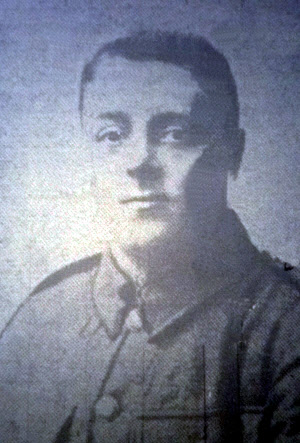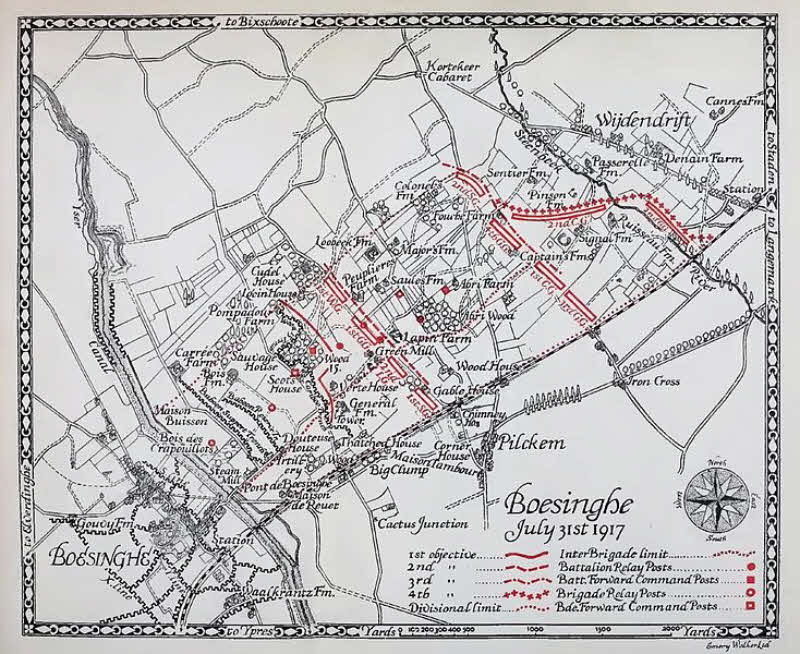
Walter Turner was born in Ossett on the 21st October 1887 and baptised at the Primitive Methodist Church, Ossett on the 6th December 1887. Walter was the eldest child three children of Suffolk-born, coal miner, George Turner and his wife Eliza (nee Wilby), who married in 1887.
In 1891, Walter has two sisters: Elsie (born 1890) and Edna aged 1 month, and the family were living on The Green, Ossett. In 1901 the family were living at Back Albert Street, off The Green, where George is working as a mason’s labourer and 13 year-old Walter was an errand boy. Walter’s sister Elsie is the only other child following the death of Edna shortly after her birth in 1891.
In 1911 Walter, now working as a warehouseman, and his sister Elsie, are living with their grandparents at 1, Radley Street, Ossett. Their parents, George and Eliza Turner, were living on Bank Street, Ossett.
On the 28th October 1911, Walter Turner married 21 year-old Gertrude Taylor at Earlsheaton Parish Church. It appears there were no children. After Walter’s death in 1917, her address was given as Gertrude Turner, 68, Marlborough Street, Brantford, Ontario, Canada. In the years that followed, machine operator, Gertrude Turner made many trips to England from her home in Canada to visit her Taylor relatives who lived in Chancery Lane, Ossett. In May 1958, a 67 year-old retired, Gertrude Turner, born 31st July 1890, journeyed from Canada to Liverpool aboard the ‘Empress of England’ with a destination of 12, Appleby Place, Halton, Leeds. Her period of stay was five months and her intended country of future residence was Canada.
2nd Battalion, Coldstream Guards was formed in August 1914 at Windsor. and was part of 4th (Guards) Brigade, 2nd Division. On the 13th August 1914 the battalion landed at Le Havre and on the 20th August 1915, the battalion transferred to 1st Guards Brigade, Guards Division.
His Service record has not survived and his MIC indicates only the British and Victory medals so that he didn’t serve overseas before the 31st December 1915.
Private Walter Turner was killed at the Battle of Pilckem Ridge, part of the third Battle of Ypres at Passchendaele. On 31st July 1917, behind the newly mastered creeping barrage, the allied troops climbed out of the their trenches along the whole front line, from Boesinghe in the North to Le Gheer in the South, and advanced towards the German forces. The enemy’s first line was quickly taken (the Germans had adapted the scheme of defence in depth, which consisted of a thinly defended front line of machine gun outposts and strongly more heavily defended support line) and the British pushed forward about one mile before meeting much stiffer resistance. Later in the afternoon the advance was stopped and pushed back in places by a carefully coordinated counter attack by specially trained troops. However, a worse enemy was afoot, the worst weather for 75 years, which turned the whole battlefield into a quagmire, the entire attack was stalled until the 10th August.
At zero hour 3:50am, 31st July 1917, on the left of the Rouler railway the Guards Division attacked with two Brigades, the 2nd Guards (1st Scots Guards and 2nd Irish Guards) met little resistance in meeting their objective. The 3rd Guards Brigade (1st Grenadier Guards and 1st Welsh Guards) also made their objective with little resistance. The second objective was taken up by supporting Battalions of the 2nd and 3rd Guards Brigades, the latter coming under murderous machine gun fire from blockhouses on the Rouler railway, this threatened to hold up the hole attack including the actions of the 113th and 114th Brigades further South. The 3rd Guards managed to clear the blockhouses and join up with the 113th and 114th Brigades. The 1st Guards Brigade (2nd Grenadier Guards and 2nd Coldstream Guards), who were in support advanced at 8:50am to take their objectives, but were held up by machine gun fire from near the Steenbeek and the slow advance of the 113th and 114th Brigades and had to dig in 80 yards short of their objective.1
The “Ossett Observer”, 2 and 3 had these obituaries for Walter Turner:
“Ossett Guardsman Falls – On The Anniversary Of His Enlistment – The sad news has been received this week that Private Walter Turner (29), of the Coldstream Guards, a married man, whose home is at 26, Wesley-street, Ossett, was killed as he was going into action on the 31st ult. The information was contained in a letter sent to his wife at South Ossett by a well-known Horbury soldier and comrade of the deceased – George Sercombe. On the day of his death, Private Turner had been in the forces just twelve months, and he went to France in the beginning of February. He used to work for Messrs. Glover and Ellis, mungo manufacturers, Gedham.”
“An Excellent Soldier: Officer’s Tribute To An Ossett Man – In confirmation of a letter which was received last week from Private George Sercombe, reporting the death of a comrade, Private Walter Turner (29), of the Coldstream Guards, whose home was at 26, Wesley-street, Ossett, an officer of the company has this week written to the soldier’s widow, saying: ‘I am very sad to say that I have the worst news for you, and I only wish I had some means of breaking to you more gently. Your husband was killed in the great advance on the 31st July, after having reached the furthest point of the attack. I cannot tell you how sorry I am to lose him, or how much he is missed by the company. It is very sad that his career out here should have been cut short so soon. He took part, only two or three weeks ago, in a most successful raid on the German trenches, and he has always proved himself an excellent soldier. If there is anything I can do for you, I hope you will please let me know. Please accept my most sincere sympathy in your great grief, which is shared out here by every officer and man who knew your husband.’
Private Sercombe has also written, acknowledging the receipt of a parcel of comforts addressed to the deceased by his widow, and stated that according to custom these have been shared among the deceased’s comrades. He also forwarded deceased’s pocket-book, and states that the platoon sergeant and all the deceased’s pals joined in sending their deepest sympathy with the widow.”

Private Walter Turner died, aged 29 years, on the opening day of the third Battle of Ypres, during the action by the Guards Division to take Pilckem Ridge on the 31st July 1917. He is buried at grave reference IV. E. 14. in the Artillery Wood Cemetery,4 Ieper, West-Vlaanderen, Belgium. Boezinge is located north of the town of Ieper on the N369 road in the direction of Diksmuide. The Cemetery is located in the Poezelstraat, east of the village.
Until July 1917, the village of Boesinghe (now Boezinge) directly faced the German front line over the Yser canal, but at the end of that month, the Battle of Pilckem Ridge pushed the German line back and Artillery Wood, just east of the canal, was captured by the Guards Division. They began the cemetery just north of the wood when the fighting was over and it continued as a front line cemetery until March 1918.
At the time of the Armistice, the cemetery contained 141 graves (of which 42 belonged to the Royal Artillery), but it was then greatly enlarged when graves were brought in from the battlefields and small burial grounds around Boesinghe.
There are now 1,307 First World War casualties buried or commemorated in this cemetery. 506 of the burials are unidentified but special memorials commemorate 12 casualties known or believed to be buried among them.
References:
1. Third battle of Ypres – Passchendaele
2. “Ossett Observer”, August 11th 1917
3. “Ossett Observer”, August 18th 1917